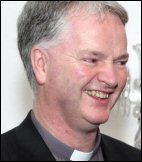“Do printed newspapers and magazines still have a future? What is the value of printed words in a world that is more and more dominated by images? What is the future of the Catholic press in this context? These are some of the questions that will be the focus of the Catholic Press Congress organised by the Pontifical Council for Social Communications (PCSC) from 4 to 7 October at the Vatican. A few days before the Congress, Mgr Paul Tighe, Secretary of the Vatican Dicastery, summed up in an interview with SIR (click here) the Pontifical Council’s main expectations for the event: “The aim is to create a ‘dynamic communion’ among participants, praising the good initiatives which have already been undertaken in various countries and supporting the establishment of informal networks among those present. In this, Internet can be of great help. Thus, the Pontifical Council’s aim is to offer concrete support to the communications world, especially by means of in-depth analysis and reflection. It is a commitment that can benefit our daily work too”. The themes for discussion, continued Mgr. Tighe, will “focus on communication and information today, even in the light of the theme chosen for the 45th World Day of Social Communications. The focus will be on the written press”. The programme for the Congress is available at: www.pccs.va.
Mgr. Tighe also focused on the theme chosen by the Pope for the 45th World Day of Social Communications (“Truth, proclamation and authenticity of life in the digital age”), released by the Holy See Press Office on 29 September. The wording of this theme – explained the PCSC – stresses the two essential components of the communications world: the traditional one and the digital one. Truth is the main and common goal, which ensures and guarantees not only a technical change but also a new way of interacting”. In this regard, recalled Mgr. Tighe, “without the contribution of truth, technological advance would only be seen as a mere change, no matter how significant it is. The digital age, in itself, does not represent a turning point with regard to the values at stake; it rather puts emphasis on the element of an authenticity of life which implies, to some extent, the examination of a sincere personal attitude towards the search for truth”. According to the Secretary of the Vatican Dicastery, “communication at the service of truth makes maximum use of all its values: vocation to dialogue, respect for the person, desire to gain a broader knowledge. Yet – he concluded – this search will bear little fruit if due attention is not given to the elements of competence and professionalism”.





